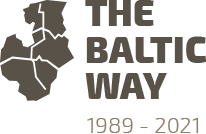For memory institutions
We invite memory institutions to not only participate in the collection and documenting process of the stories but also inform about the testimonies regarding the Baltic Way and its organisation available in their collection. For instance, set up an exhibition of objects, photographs and documents. If for some reason this is difficult, it is also possible to use travelling exhibitions about the events of the Awakening prepared by other museums.
To encourage inhabitants to participate in the collecting process of the Baltic Way stories, organise events which will bring back memories of the Baltic Way period to its participants and inform young people who have not experienced this period about it. For example, organise a meet-up with the activists of the Popular Front of Latvia divisions. Use the collections of your institution to stimulate conversation and ask the invited participants and visitors what their experience of the Baltic Way was like. Invite other visitors to participate as well and inform about the opportunity to participate in the project The Baltic Way Stories.
Give the generation who did not experience the Baltic Way opportunities to find out more about it. Create a museum pedagogic lesson about the Baltic Way using the objects in your own collection or the travelling exhibition offers. The lesson will help understand the historical circumstances in which the Baltic Way took place. For young people who have grown up in an independent country it may not be self-evident. At the end of the lesson inform the participants about The Baltic Way Stories and encourage them to participate in the collection of the stories!
For educational institutions
We invite educational institutions to organise educational events, as well as encourage students to interview their parents, grandparents, friends and acquaintances. For instance, organise a lesson about the Baltic Way. Use the supporting materials developed by the Latvian National Commission for UNESCO to inform not only about the course of the Baltic Way but also about its historical meaning and international recognition. A class meeting might be an appropriate time to discuss the values that drove the inhabitants of the Baltic states to participate in the human chain and their topicality nowadays. Invite the students to document the stories of their relatives — it will not only help preserve historically significant information but also promote intergenerational dialogue in their families.
Organise a meet-up with people who participated in the Baltic Way! Use The Baltic Way Stories form to help your students prepare the questions. Such a meet-up can encourage students to find out more about the experiences of their relatives, or it can be organised as a final event after the students have participated in the documenting process of the Baltic Way stories. This will give them an opportunity to see the diversity of experiences and assess the unique value of each individual story.
Organise a thematic week at the school! Use this time to celebrate the Baltic Way together. Encourage students to think about and discuss the topicality of the Baltic Way values nowadays. Urge the students to include the experience gained while collecting stories in their opinion. When organising the Baltic Way week, use the resources of museums, libraries and archives.
For libraries
We invite libraries to encourage local inhabitants to share their stories. Organise a series of story evenings with the participation of several invited speakers, giving all the visitors an opportunity to express their thoughts. To recall the time of the Baltic Way, create an exhibition of books and periodical publications about the events of the Awakening. A conversation starter could be a demonstration of a documentary or a memory video.
We invite the library staff to participate in the collection and documentation process of the Baltic Way stories as much as possible, as well as share their own Baltic Way stories.

